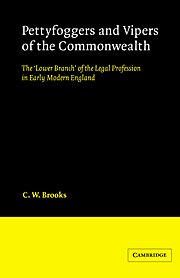 Pettyfoggers and Vipers of the Commonwealth
Pettyfoggers and Vipers of the Commonwealth Book contents
- Frontmatter
- Contents
- List of tables and figures
- Preface
- Abbreviations
- 1 Introduction
- 2 Lawyers and the royal courts in London during the reign of Elizabeth
- 3 The legal profession in the provinces
- 4 The increase in litigation
- 5 The causes of the increase in litigation
- 6 The increase in litigation and the legal profession
- 7 The attitudes of layman and attempts at reform
- 8 Clerkship, the inns of chancery, and legal education
- 9 Private practice
- 10 Public office and politics
- 11 Fees and incomes
- 12 Conclusion
- Appendix: Analysis of the social status of litigants in King's Bench and Common Pleas, 1560–1640
- Notes
- Select bibliography
- Index
- CAMBRIDGE STUDIES IN ENGLISH LEGAL HISTORY
8 - Clerkship, the inns of chancery, and legal education
Published online by Cambridge University Press: 28 October 2009
- Frontmatter
- Contents
- List of tables and figures
- Preface
- Abbreviations
- 1 Introduction
- 2 Lawyers and the royal courts in London during the reign of Elizabeth
- 3 The legal profession in the provinces
- 4 The increase in litigation
- 5 The causes of the increase in litigation
- 6 The increase in litigation and the legal profession
- 7 The attitudes of layman and attempts at reform
- 8 Clerkship, the inns of chancery, and legal education
- 9 Private practice
- 10 Public office and politics
- 11 Fees and incomes
- 12 Conclusion
- Appendix: Analysis of the social status of litigants in King's Bench and Common Pleas, 1560–1640
- Notes
- Select bibliography
- Index
- CAMBRIDGE STUDIES IN ENGLISH LEGAL HISTORY
Summary
The preceding chapter showed that one of the principal worries of contemporaries about the lower branch of the legal profession concerned standards of training. This one will explore in more detail the nature and quality of the training undergone by the mass of practitioners, the attorneys and solicitors, and at the same time consider their place in Renaissance England's version of law schools, the inns of court and inns of chancery in London.
Unlike that of their counterparts in most other European countries, the professional training of English lawyers had little to do with the universities. Medieval Oxford and Cambridge taught the canon law and the civil law, the laws of the church. But for several centuries before the accession of Elizabeth, men aiming to practise in the royal courts as counsellors or serjeants had learned the common law of the realm at the inns of court and chancery, which were located in Holborn, just down the river Thames from Westminster Hall. The inns offered learning exercises, readings, and moots, which enabled students to learn the elements of the law, and by the end of the sixteenth century, the call to the bar at one of the inns of court had become the accepted qualification which enabled a man to claim the right to audience before the courts and so enter the upper branch of the profession as a counsellor at law. Within the upper branch, in other words, membership of an inn became an essential prerequisite for becoming a lawyer.
- Type
- Chapter
- Information
- Pettyfoggers and Vipers of the CommonwealthThe 'Lower Branch' of the Legal Profession in Early Modern England, pp. 151 - 181Publisher: Cambridge University PressPrint publication year: 1986


